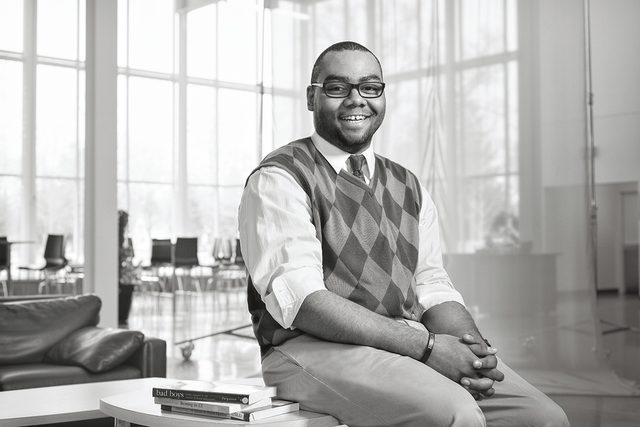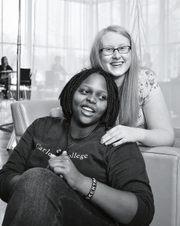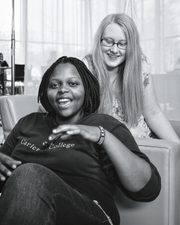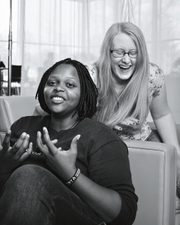How do we help first-generation and low-income students thrive in an environment that may feel foreign to them and their parents? The college’s federally funded TRIO program steps in to provide the financial and emotional support students need to succeed at Carleton.
 In August 2014 Vanessa Martinez ’18 boarded a plane in San Francisco to travel to Carleton for her freshman year. The daughter of Mexican immigrants, Martinez was not just the first person in her family to attend college; she was the first to graduate from high school.
In August 2014 Vanessa Martinez ’18 boarded a plane in San Francisco to travel to Carleton for her freshman year. The daughter of Mexican immigrants, Martinez was not just the first person in her family to attend college; she was the first to graduate from high school.
When she arrived in Minneapolis, Martinez called Carleton staff member Kathy Sommers, who picked her up, drove her to Carleton, and helped her get settled in her dorm room.
Sommers works with Carleton’s TRIO Student Support Services, a federally funded program that helps first-generation and low-income students and students with disabilities succeed in higher education. TRIO dates back to 1964, when Upward Bound, a program to help these students get into college, was introduced as part of President Lyndon Johnson’s War on Poverty. Next came Talent Search, which helps students succeed in high school, and finally Student Services (now Student Support Services), which supports them while they’re pursuing a baccalaureate degree. These three programs collectively were called TRIO. More programs have been added since, but the TRIO moniker remains.
TRIO programs are funded every five years through a competitive grant sponsored by the U.S. Department of Education. The application process requires Carleton to provide data to demonstrate that the program is meeting its goals and that the need persists. TRIO has been funded continuously at Carleton since 1981 and was renewed most recently in 2015.
TRIO staffers share information about the program with all eligible students and invite them to apply to the program. It serves 130 Carleton students per year (roughly a third of the eligible students on campus), and most new cohorts fill with first-year applicants before fall term begins. A program goal is to serve at least 75 percent of the students on campus who are both first-generation and low-income.
While the grant supports TRIO personnel and programs, Carleton provides physical space in a house on College Street, just two doors down from the Weitz Center for Creativity. A comfortable living room offers meeting and study space. TRIO’s textbook lending library, which includes a copy of nearly every book used at Carleton, is shelved throughout the upstairs rooms.
The house serves as a central location for academic advising, Career Center support, and specialized tutoring. The chair of the math department often stops by to assist students with math, and TRIO’s recently hired quantitative skills coordinator is also available for assistance. Beyond gathering resources in one place, the TRIO house helps put students at ease. “It can be intimidating to go to different places and approach unfamiliar people for help,” says TRIO director Trey Williams. “This house really does feel like a home rather than an office. Students are comfortable here. They can relax.”
Currently finishing up his first year at Carleton, Williams has big plans for TRIO. Over the next several years he’d like to offer more workshops to help students with college milestones (such as choosing a major, obtaining internships, studying abroad, or completing comps), revamp TRIO’s website, and increase the program’s profile at Carleton. “I’d also like the students to be part of the wider TRIO community,” says Williams. “We’re a federally funded program, so I’d love for them to go to Washington, D.C., meet with Congress, or participate in policy seminars.”
Above all, though, Williams is focused on retaining and graduating TRIO students. Currently 88 percent of Carleton TRIO students graduate within six years, compared to a national rate of 47 percent for students who come to four-year institutions from a family in the bottom income quartile (according to a 2015 report from the Pell Institute for the Study of Opportunity in Higher Education).
Typically TRIO-eligible students have had less access than their noneligible peers to test-prep resources (resulting in lower SAT and ACT scores), and less exposure to AP courses or advanced math courses. They’re also less likely to enroll in science and math courses in college. But staff members are quick to point out that, despite the challenges posed by their backgrounds, Carleton’s TRIO students are as smart and motivated and exceptional as their classmates are—and TRIO is committed to helping them close any gaps.
“We want to help TRIO students survive and thrive at Carleton,” says Joy Kluttz, director of Intercultural and International Life and one of the authors of Carleton’s most recent TRIO grant proposal. “For the students who come from underresourced high schools, the resources at Carleton might look very different or unfamiliar, and they might have more challenges learning how to navigate the system and the culture.”
To that end, during their first two years on campus TRIO students are assigned academic advisers from the TRIO office who are positioned to connect the students with campus resources, introduce studying and time-management strategies, and help them face the unfamiliar and overcome frustrations. Students also meet regularly with peer mentors throughout their first year. “The TRIO program takes a holistic advising approach,” says Kluttz. “It’s not just about academics—it’s about how you’re doing socially and in your personal and family situations.”
Vanessa Martinez’s mentor, for example, encouraged her to get involved in activities outside the classroom. “Initially, I thought I should focus on academics,” Martinez says, “but my peer mentor encouraged me to try extracurriculars. I joined a South Asian dance troupe and I played intramural Frisbee. That’s how I met some of my closest Carleton friends. TRIO encouraged me to branch out and not be afraid to take risks and explore, which is a big aspect of college.”
Indeed, TRIO students and staff members don’t just work together—they have fun together, too. Students can find chips and salsa at the house on Fiesta Fridays, participate in off-campus retreats and field trips, and plan for the future through TRIO-sponsored graduate school visits. They can invite friends to many of the house’s social events, including game nights and small-group discussions on socioeconomic issues.
TRIO is only one of several Carleton initiatives that support low-income and first-generation students. Carleton also partners with QuestBridge, which helps high-achieving low-income students successfully apply to top colleges, and the Posse Foundation, which sends a cohort of student leaders (often from low-income and/or first-generation families) to Carleton on full scholarship each year. Dean of students Carolyn Livingston recently commissioned a task force to report on the experiences of low-income students at Carleton, including what activities and groups are difficult or impossible for them to join due to cost.
“Some students are fulfilling their dreams by coming to college, but we want them to do more than just come—we want them to enjoy it and make the most of the opportunities here,” says Livingston. “We can’t be the great equalizers, but we can close some gaps. And, above all, we have to talk about the implications of socioeconomic diversity at Carleton. The students from low-income and first-generation backgrounds are talking about it among themselves, but they’re going to feel like the rest of the community is really disconnected if we’re not talking about it, too.”
Livingston believes it is critically important to help low-income and first-generation students thrive at Carleton not just because it’s the right thing to do, but also because all students benefit from having a diverse student body on campus. “We want students to learn to appreciate different walks of life and to think about diversity in their decision-making processes,” Livingston says. “This will make Carleton a better institution and it will prepare our graduates for the work we want them to do in life.”

Coming Home
When Nicolina Hernandez ’08 decided to attend Carleton, she broke her mother’s heart—and her mother’s dependence on her daughter. She also did something no one in her family had ever done before: leave California and pursue a college degree.
Coming to Carleton wasn’t easy, but Hernandez found comfort in the Latin American Student Organization and Project Friendship, a volunteer program that pairs Carleton students with Northfield kids, through which she mentored a Latina youth. She felt particularly drawn to TRIO, where she worked in the textbook library and as a peer mentor. “It was a safe space,” she says. “TRIO supported me in ways I can’t describe.”
Some TRIO assistance was tangible: lending textbooks to ease the financial burden and introducing her to campus academic resources. “I wasn’t a 4.0 student, but TRIO helped me with time management skills and encouraged me to [use] the writing and math skills centers,” says Hernandez. “It gave me the confidence and courage to ask for help.” During her first Minnesota winter, TRIO staff members chipped in to buy Hernandez a warm coat.
Hernandez returned to California after graduation via the competitive California State Capitol Fellows Program and now works for Political Solutions, a lobbying firm in Sacramento. “Today I wear a power suit and testify before policy committee hearings on legislative proposals that affect millions of Californians,” she says.
She graduated in 2015 from the HOPE Institute, which provides training and networking to help Latinas get more involved in state leadership. This year Hernandez joined the planning committee for Latina Action Day, which brings 500 Latinas to the state capitol to lobby for health care, environmental issues, and other topics important to their communities.
Best of all, she lives near the family she had to leave years ago. She also recently bought a house, realizing a longtime dream. “I’m proud of my roots, but the path I chose was important for me,” she says. “I hope Carleton continues to provide these great programs and resources for others like me who take the road less traveled in their communities.”

Transformation
Now a TRIO peer leader, Brandon Marks ’16 has come a long way since he arrived on campus from the South Side of Chicago wanting nothing to do with the program.
“When I was admitted to Carleton, I got a letter telling me about TRIO,” he says. “I wasn’t interested. I was worried about adding more commitments to my plate, and I didn’t know if I wanted to be so clearly labeled as a low-income, first-generation student. I didn’t know the culture at Carleton or how that would play out for me.”
But thanks to recommendations from friends and recruitment by then–TRIO director Mitchell Madson, Marks did apply for TRIO, and “I’m really glad I did,” he says. “I want Carleton students to learn about TRIO and the variety of students it supports.” He enjoys having a leadership role in the program and giving younger students the same support that got him through his difficult freshman and sophomore years.
As valedictorian of his high school class, Marks felt ready to enroll at Carleton and pursue his dream of going to medical school, but he quickly discovered that he was underprepared for the academic rigor, especially in science. At the same time, he fell in love with psychology—a subject that wasn’t offered at his high school.
On the advice of Carleton’s premed adviser, Marks spent his first spring break shadowing medical professionals and returned to campus his sophomore year with a big decision to make: Would he retake a required biology course and put in the extra work needed to succeed in premed? Or would he change directions and pursue something that sparked his passion but was completely new and unknown? Marks chose the latter, and declared a major in psychology.
He’s also completing a concentration in educational studies, which will allow him to help young people like himself succeed in college. He’s already a role model for his younger siblings. “My mom asks me all the time how it feels to be the first college graduate in our family,” Marks says. “I say I’ll let her know when I do it. I’m just focused on finishing strong. I want to accomplish all my goals both for myself and for my family.”
Juggling Act
On Tuesday nights, Shelby Jones ’19 often studies in the TRIO house living room with her peer mentor, JoJo Kuria ’16 (Plymouth, Minn.). Kuria recommended the study spot last fall at the start of Jones’s freshman year. “It’s usually pretty quiet here, and it’s really comfortable,” says Jones, noting that the two-story house on College Street is her home away from home and the TRIO students and staff members are her family.
Jones’s actual home is in La Vergne, Tennessee, just outside Nashville. She’s close to her mom and her three-year-old sister, so it was hard for her to move to Minnesota. “I was excited to go home for winter break,” she says, “but when it was over, I was excited to come back to Carleton. I love it here.”
But life at Carleton is not without its challenges. First and foremost, Jones worries about how to pay for everything. Her campus job at Carleton’s ITS helpdesk (where she provides computing support) helps with tuition; she also works a few hours a week at a Northfield sandwich shop to cover other expenses.
“Some students have tried to convince me to quit my job,” Jones says. “They don’t understand how much I need the money.” When her friends decide to get dinner downtown instead of eating on campus, they don’t realize that Jones has to consider whether or not she can afford to join them. “Thanks to my job, sometimes I can,” she says, “but I have to think about it.”
The TRIO lending library saves her the cost of textbooks, and she leans on TRIO staff members and peer mentors when she needs advice or emotional support.
She also appreciates the fact that TRIO staffers are urging more campuswide discussions about socioeconomic diversity. She hopes the conversations will raise awareness and, eventually, lessen the pressure she feels to justify her decisions with a “disclaimer” about her finances. “Talking about money can be awkward at first, but it gets easier,” Jones says. “I just want everyone on campus to know that we’re here.”
Photos of Brandon Marks, Shelby Jones, and JoJo Kuria by Hai Ngo ’12
Photo of Nicolina Hernandez by Eric Muetterties
Illustration by Liza Lutik/Thinkstock



